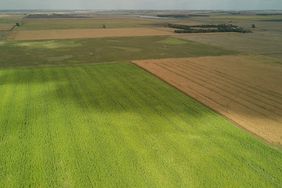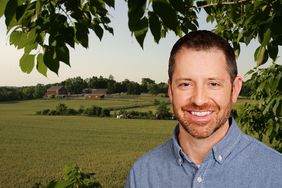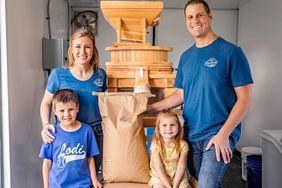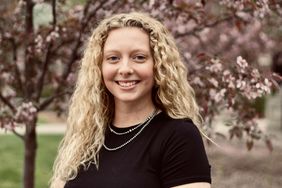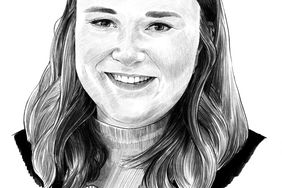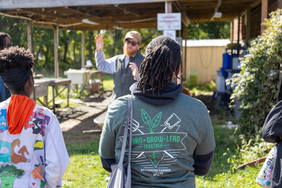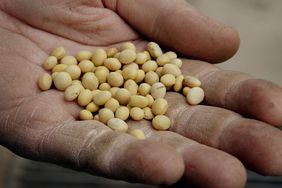:max_bytes(150000):strip_icc()/20220627_SuccessfulFarming-CenturyFarm_16452028129-2-2000-17550b5ba3a64e1c91e06239aabe7dc8.jpg)
Strolling through the mature tree row of Bill and Louise Walter's farm is a walk down memory lane for old machinery buffs. Tools from the farm's founding, in 1892, remain, although Jeri and Jeff Bates — Bill and Louise's daughter and son-in-law — are working to clean it up.
The Bateses are the third generation to farm this place in Mitchell County near Beloit, Kansas, and they are relative newcomers to the operation. They moved to Beloit in 1998 to raise their family, and Jeff and Jeri began helping her parents on the operation. They never missed a chance to learn from Bill and Louise, who were just one generation from the hardships and toil of first-generation farmers.
:max_bytes(150000):strip_icc()/20220627_SuccessfulFarming-CenturyFarm_1697-66559bc873e04c548dcfde742ec3c5d8.jpg)
Dan Videtich
Hoop Dreams
Bill Walter's first love was basketball.
A star on the hardwood at St. John's High School in the late 1940s, the farm kid from west of Beloit earned a scholarship to Benedictine College in Atchison, Kansas. As a freshman, he could hang in there with the seniors.
"I thought I could handle this," the 91-year-old Bill recalls. "I'd get stronger and better the next few years."
He could tell the team was building up to something special, and it culminated in 1954, when the Ravens won the National Association of Intercollegiate Athletics basketball championship.
Except Bill was no longer part of the team.
After his freshman year, he'd been called back to the family farm by his father. It was a premature end to what looked like a promising career.
Bill was the youngest of five kids, born to Herman and Minnie Walter when he was 58 and she was 45. During Bill's childhood, the family grew corn, wheat, and alfalfa; they also had hogs, four milking Shorthorn cattle, and about 250 chickens.
By the time Bill returned to the farm, his dad's practices were dated. It's hardly a surprise, given that Herman's farming career began in the 1880s.
He met Louise when each were asked to be godparents for a mutual friend's child.
"We just clicked," Louise says. But there was one problem: she lived in Shawnee, Kansas (a suburb of Kansas City), and he lived near Beloit, which was at least a five-hour drive away.
They visited each other frequently; he drove to Shawnee and she rode the bus to Beloit.
Even after Bill returned to the farm, he never left the hardwood. He coached the sport at St. John's for about a decade, his teams noted for their discipline and toughness.
:max_bytes(150000):strip_icc()/20220627_SuccessfulFarming-CenturyFarm_1561-110c4f2b658c439e8d87ae1a1ff55bfe.jpg)
Dan Videtich
Pressing through
They married in 1958.
The move from the bright lights and big city to rural Kansas was not easy for Louise.
"I had worked in Kansas City and rode to work every day with my mom and dad. I'd come home at night, and there were five in my family and my grandma lived with us. There were all these people around.
"And then I came out here. Bill didn't leave me any more than he had to, but you know, he had to go make a living. There was no television. I got so homesick," she recalls. Bill encouraged her to return to Kansas City for a little while.
"So I went down there and I stayed probably about a week and visited my family and friends and I was fine," she says.
Soon after, they welcomed a son. Five more children followed, and Bill and Louise decided to build a new house on the homestead.
It was a long project, as Bill had to work off the farm to make ends meet.
"I did construction, building bridges for the highway department," he says. "Wherever a buck came from."
After Herman died in 1963, Bill, with Louise by his side, was able to be more innovative. He was one of the first to irrigate, on an alfalfa field just south of his home, not far from the Solomon River. They also grew irrigated corn and soybeans and were early adopters of hybrid grain sorghum. The Walters also grew wheat, and raised dairy and beef cattle, poultry, and had large gardens.
Vacations were scarce and often spur of the moment.
Destinations were to Colorado or to Louise's parents in Kansas City. "We never planned it, but it was such a big highlight when we all would go together," she adds.
It Hasn't Been Easy
"Years ago we were going through a pretty low time. The prices were low, the kids were home, and everything was tough. There was a natural gas pipeline 30 miles away that was looking for help," Louise says. "So we thought maybe we should sell what we have and work there. We talked about it and talked about it. And we decided the kids would be so much better off right here."
Bill was eager to pass on his love for basketball to his kids.
In the hayloft of an old barn, Bill erected three basketball goals and drew court lines on the floor so his kids could play ball whenever they wanted.
Each child excelled at academics and athletics, with five of the six playing college sports: David played football at Kansas State University; Joe played basketball at Bethany College; Karen ran track and played volleyball at McPherson College; Jeri played softball at Bethany College; and Steve ran track at McPherson College. Second daughter Barbara attended a college that didn't have women's sports at the time.
Ever the coach, Bill attended all his kids' games, and grandkids', too.
"You know, whenever we played sports or did an activity, they dropped everything to go to town. That was hard on him, but I'm so glad they did that," Jeri says.
"They used to say six months from now it's not going to make a bit of difference whether you were in the field or at the game," she adds. "But to that kid, it's important you were there tonight."
:max_bytes(150000):strip_icc()/20220627_SuccessfulFarming-CenturyFarm_1703-a3c6526343724627b73959950e630a4a.jpg)
Dan Videtich
The Next Generations
Jeff grew up in Oakley, Kansas. He helped his grandfather farm and also worked for a farmer near his hometown. Both Jeff and Jeri lived in Kansas City when they met, and they moved to Manhattan, Kansas, after they were married. But after their oldest was born, they decided they would like to raise their children near Jeri's family in Beloit. Jeff taught business and computers at Beloit High School, and Jeri was a physical therapist at the local hospital.
The teaching job provided opportunity for Jeff to spend time on Jeri's family's farm.
"I just basically started working with Bill, and he helped us kind of get set up with a neighbor," Jeff recalls. He and Jeri rented a pasture, bought a few cows, and began building their herd.
"We bought some pasture and ground, and before long we were running up to 75 cows," he adds.
Bill was instrumental in helping haul water when necessary or breaking ice during the winter.
In 2013, Jeri and Jeff took over the Walters' operation —a little over 1,000 acres of cropland and pasture, most of which they lease from Bill and Louise.
It's their operation, but Jeff still defers to his in-laws.
Ironically, Jeff is bringing his own innovation to the farm. He plants cover crop mixes after wheat harvest, on which the cattle graze through midwinter.
"If I can get to February 1 each year before I roll out a bale of hay, I'm already halfway through the winter. As a teacher, I can do chores after school when the days are getting longer," Jeff says.
Moving back to be closer to her parents has given Jeff and Jeri's five kids a chance to learn the farm life. "Each of them has owned some cows and been able to put some money into a college fund," Jeff says. Their kids — one daughter and four boys — have carried on the tradition of working hard and being grateful for the opportunities they've earned.
And Bill and Louise? They remain grateful, too.
"When we get a check for selling cows or grain, I thank God. And I thank Jeff and Jeri," Louise says.
It may not have turned out the way Bill Walter dreamed of so many years ago. Seventy years after he was called home, he looks back on a life complete with 64 years of marriage to Louise, their six children and 18 grandchildren, farming, and a whole lot of hoops.
